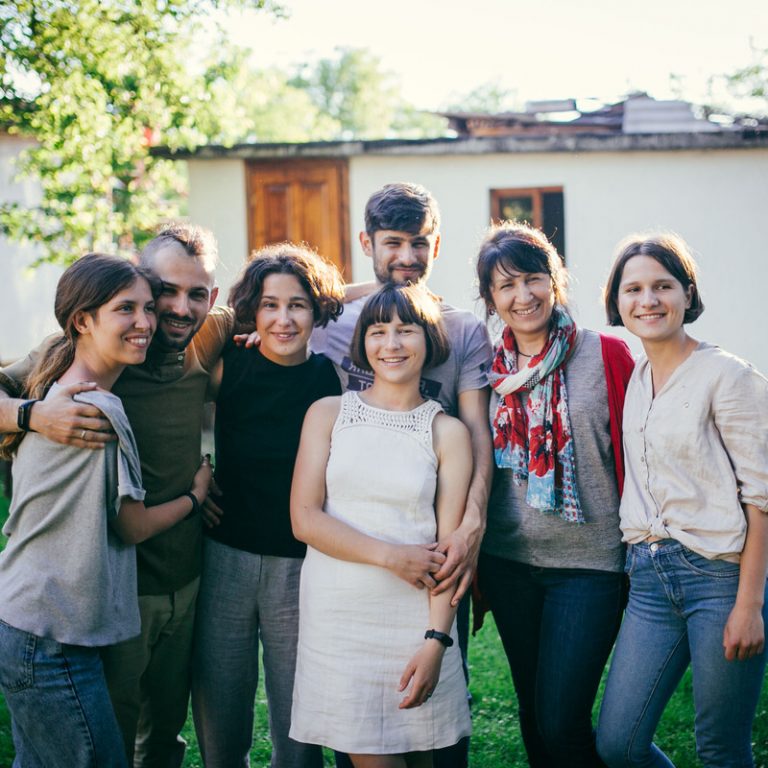Natalia and Petro Diduly are parents of five children, participants in the Revolution on Granite, members of the Lion Society and of the Ukrainian Catholic University community. Two of their sons, Yurko and Pavlo, are the founders of the Building Ukraine Together program and the Free Space, a network of alternative dormitories as well as the creators of the Granny Dozia social project. Their three daughters are graduates of the Ukrainian Leadership Academy and students of the Ukrainian Catholic University, but also founders of the Marvellous Kayak, a social tourism business.
Even this is not a complete picture of the Diduly family’s dedication to social good. They live in a small house in Ryasne, a part of Lviv remote from the center. The family share rooms, but the doors of their home are always open to guests. How does this family manage to maintain such a strong work ethic from generation to generation?
Petro and Natalia Diduly, and their five children — is an example of a family united by common values and goals. They have created a culture of friendship and healthy competition, where the children create their own projects and support one another.
Sisters Galya, Marta and Gannusia completed their studies at the Ukrainian Leadership Academy, which is a 10-month personal and community development program for school graduates. Currently, the girls are developing new social projects whilst studying at the Ukrainian Catholic University. Galya wants to support orphans; Marta goes serve once a year at the Heart House in Honduras, and Gannusia is developing the “Girls Leadership Community” — a camp for girls that combines learning and recreation with the goal of personal development.
The older sons Yurko and Pavlo have already completed their studies at the Ukrainian Catholic University. Now they are both completing their own mission projects.
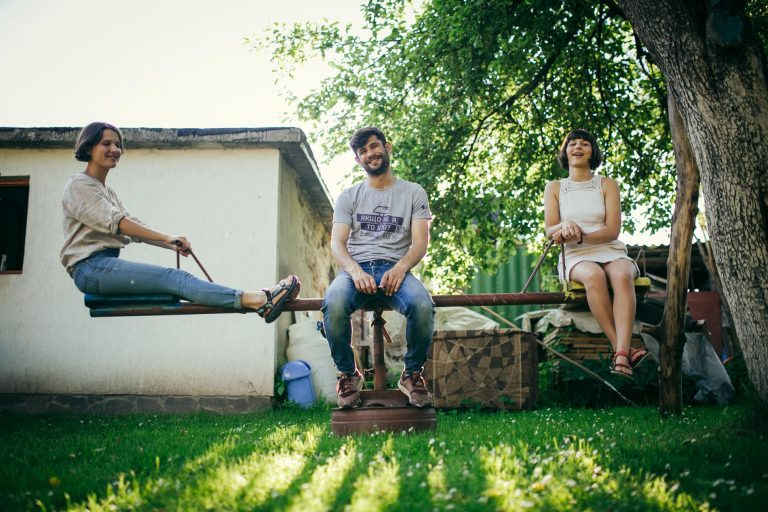
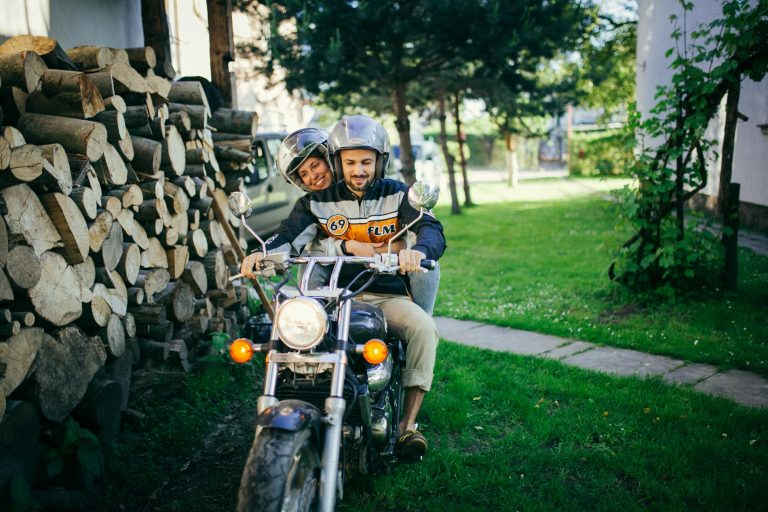
slideshow
Yurko Didula became a co-founder of the all-Ukrainian volunteer camps program Building Ukraine Together (BUR). Pavlo Didula created the Free Space — an environment for informal education and engagement with young people. Pavlo says that in their family, it’s impossible to sit around and do nothing.
— The fact that everyone does something in our family is a challenge for all the others. My older brother is an example of creativity: he set a very high bar for all of us with his life philosophy and values. I was helping him shoot the first videos for Building Ukraine Together and I realized that what Yurko is doing is historic for our day and age.
Natalia and Petro have always been active citizens in Ukraine. They met when they took part in the then forbidden theatrical acts — the “verteps”, as well as kayaking. A few years later in the late 1980s, they became members of the Lion Society. Petro participated in the Revolution on Granite, a student political protest, in 1990 and later the Orange Revolution in 2004. During the Revolution of Dignity in 2014, almost the entire Diduly family traveled to the Maidan.
THE LION SOCIETY
An independent organization established in 1987 in Lviv that works towards Ukrainian national revival and cultural development.
Natalia Didula says that children should not be raised, but rather loved and given time and attention. In the Diduly family, all of the children were encouraged to read, draw, sing and develop their creativity. . Growing up, all five were members of the Plast. At Christmas, Peter and Natalia used to arrange family “verteps” where the children were the main actors.
PLAST
Ukrainian scout organization that encourages the patriotic upbringing of young people on the basis of Christian morality.– At first, when the kids were little, we as parents organised little theatrical performances for them to act and sing. . Then they came up with their own scenarios. They stopped asking us for help in the rehearsals, so we could no longer adjust anything. The verteps always turned out to be very interesting.

UCU Community
Peter Didula has several degrees, including construction and journalism. He became one of the first graduates of the Ukrainian Catholic University — a private educational theological institution in Lviv. For 20 years, Peter Didula has been working as UCU’s press attaché. Yurko Didula believes that the university environment and the values on which the institution is built have had a significant impact on their family.
— The UCU team, led by Boris Gudziak, believed that it could solve the problem of low quality education in Ukraine, and it has. To me they are an example of many people working hard to make a dream happen. When the university was founded it was a miracle, and made me aware that there were other problems that could be solved. Everyone working in the UCU environment has been shaped into a proactive citizen who understands the need to play their part to make life better in our country.
The Diduly family often open their home for migrants and guests from Eastern Ukraine. This is nothing new, as projects that establish links between young people from different regions were implemented here before the war started in 2014. Yurko Didula says that while studying at UCU, in 2010 they formed a student fraternity and started a project called “Easter Together”. This was an initiative where UCU students invited young people from southern and eastern regions of Ukraine to Lviv. Together they would explore Easter traditions, get acquainted with the sights of Lviv and build friendships. The Easter Together campaign has become an annual event for the University and continues today.

Marvellous Kayak
As a family the Didulys enjoy active holidays and meaningful trips. Kayaking is a family hobby they have turned into a joint business. “Marvellous Kayak” is the Diduly Family Travel Agency which organizes educational, recreational, team-building and other kayaking tours in picturesque parts of the Dniester Canyon. Galia Didula believes that working together as a family is both a challenge and an opportunity to unite.
— This is our first joint project. It is sometimes difficult, but it is fun to do something together. It’s always friendly and chilled, and having a common cause to work towards refines our relationships even more.

Granny Dozia
Theodosia Koziy, or Granny Dozia, as she is affectionately called in the family, is the maternal grandmother of the five Diduly grandchildren. Granny Dozia has witnessed many key events in the history of Ukraine. During World War II, she lost her mother and since her childhood she has taken responsibility for her very large family. She was relocated from Poland during the Vistula Operation in 1947. Pavlo Didula says that Theodosia has always had a patriotic attitude and firm values: God, Ukraine and justice.
— That is why Granny Dozia plays such an important role: she is responsible for everything. She built a house for us, and put her house in order. She worked hard around the house, which required good management skills. This spirit has become ingrained in the DNA of our family, because our grandmother has a firm hand and loves everything to be her way.

With the grandmother’s consent, the grandchildren decided to develop a social business under the “Granny Dozia” brand. The Didulys produce jam and tea, and a percentage of sales goes towards the development of the Free Space network. Most of the organizational processes of this shop were taken over by Pavlo Didula. He explains that, with the help of the Granny Dozia brand, Theodosia translates the values and proactive position of the family.
— On Facebook I developed the brand around an idealized version of our granny. I maximized my grandmother’s strengths and did not mention at all the traits that became a stumbling block in our relationship. Granny Dozia always forced us to work hard, and wanted her way. . But at the same time she would not quarrel for a long time — she always apologized and chose to forget any arguments.
In 2018, on the recommendation of her grandchildren, Theodosia Koziy decided to invest her savings in the Urban Space 500 public restaurant, which opened in September in Kyiv. The concept of the establishment is that its founders and investors are 500 socially active people, and 80% of the restaurant’s profit goes towards the implementation of urban development projects in Kyiv. Granny Dozia had always been saving money for her own funeral, but in the end she decided to invest her money in something that aligns with her values and would last.
— I watched some videos about the Urban Space 100 restaurant in Ivano-Frankivsk and the fruit of its work (one of the results is the Promprylad plant — ed .), and I carefully studied the history of [of authors of the project] Other Education. I have always believed in community-based projects. That is why, with my two grandchildren, we have decided to invest our money in a cause that is definitely changing Ukraine for the better.

On August 24, 2019 at the age of 89 Theodosia passed away. Despite this, the family continues to grow this small social business, keeping the desires and values of the founder of the Granny Dozia brand. Pavlo Didula says that Theodosia’s tough upbringing and strong principles set an example for the whole family.
— Our grandmother’s impact is her example. In every family, you have the father, the embodiment of justice, and the mother, the embodiment of charity. Our grandmother was a so-called police officer. She combined all the values of justice, honesty, work, love for the land — all of which she naturally passed down to us. If our grandmother had studied for a qualification in leadership or humanitarian work, she would have been a good leader in an organization. Instead she got the education that was available at the time, (in Soviet times, Theodosia studied economics at the Lviv Polytechnic Institute — ed .). Even if this was not her calling, she simply adopted the basic principle of work and prayer in everything she did — ora et labora in Latin.

Building Ukraine Together
Yurko Didula lived in the United States of America for three and a half years, where he studied historical and political science and worked for the National Endowment for Democracy. He returned to Ukraine in the summer of 2014 and started working at the Lviv Education Foundation. Yurko says he always wanted to live in Ukraine. And in order to live and feel comfortable not only emotionally but also financially, he knew that a huge amount of work needed to be done. What the Lviv Educational Foundation does is exactly what Yurko Didul wanted to invest his time in.
— The Lviv Education Foundation is a non-governmental organization that has been active for more than 15 years in various fields (it supports a network of volunteering, social and educational initiatives. — ed .). It helps the state transform state boarding schools and create alternative forms of care for orphaned children, and supports orphanages where children live in “families”. This is one of the largest programs of the foundation.
NATIONAL DEMOCRACY FUND
Private non-profit organization, National Endowment for Democracy, NED.
Yurko Didula became one of the founders of the Lviv Educational Foundation Building Ukraine Together program. When the war started in 2014, the idea of volunteer restoration camps emerged as a response to the need to help people in eastern Ukraine whose homes were hit by shelling. The foundation organized the first volunteer camp in Kramatorsk in 2014, just after the city was liberated. The first houses of the program were built there with the local residents.
— After a two-month camp in the city, we realized that through working together and helping one another, an environment of [active] people emerged. Together with them we created the Free House, the first youth center in Ukraine.
FREE HOUSE
Space for meetings, themed events, informal education and social projects in Kramatorsk.
Those who participate in Building Ukraine Together camps are volunteers from all over Ukraine. They travel to cities and villages to unite people around a common cause: rebuilding homes for families in need or building public spaces and youth centers. Within five years, more than 2000 volunteers have joined the Building Ukraine Together program, who have visited more than 40 settlements and renovated nearly 200 homes.
— We treat our program and foundation as a tool to empower people. We travel around the cities of Ukraine, look for potential local agents of change and support them. For example, the Free House in Kramatorsk is not a Lviv Educational Foundation project. It was started when a local team was created with our support, and felt that it could change the space around them. They have set up a youth center that is the driver of [change] in their city; they organize festivals and do urban planning.
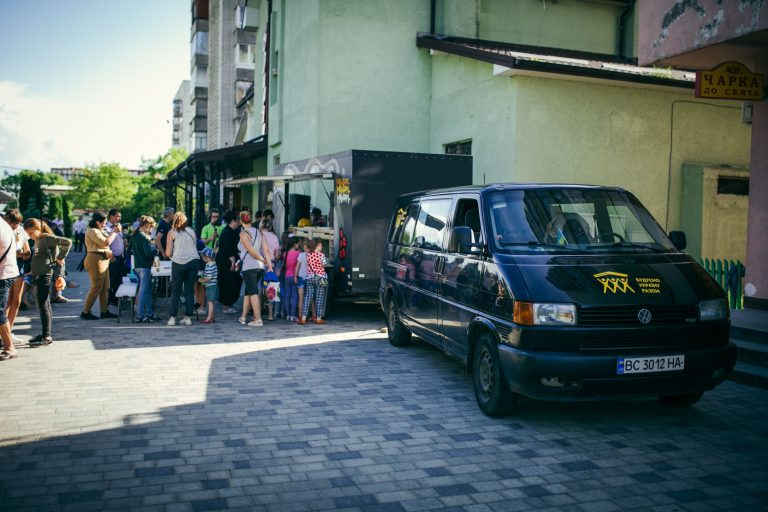
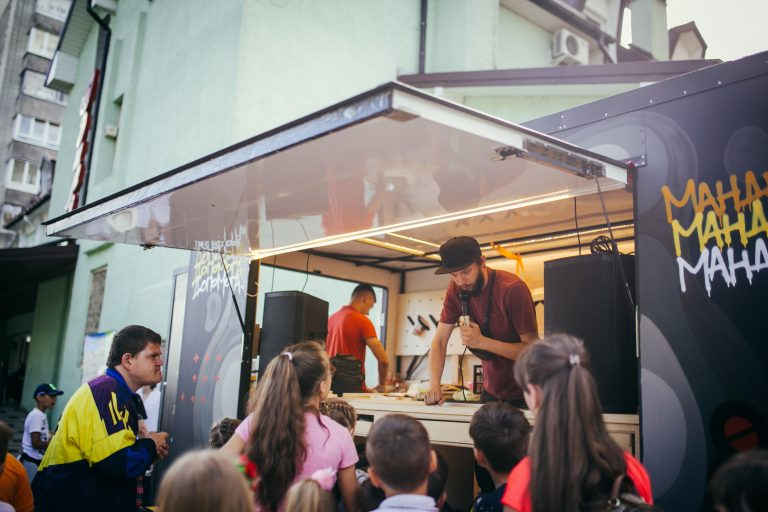
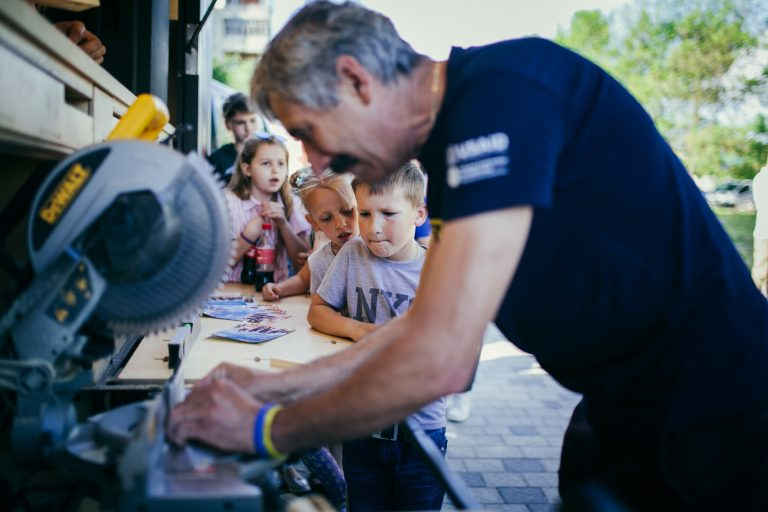
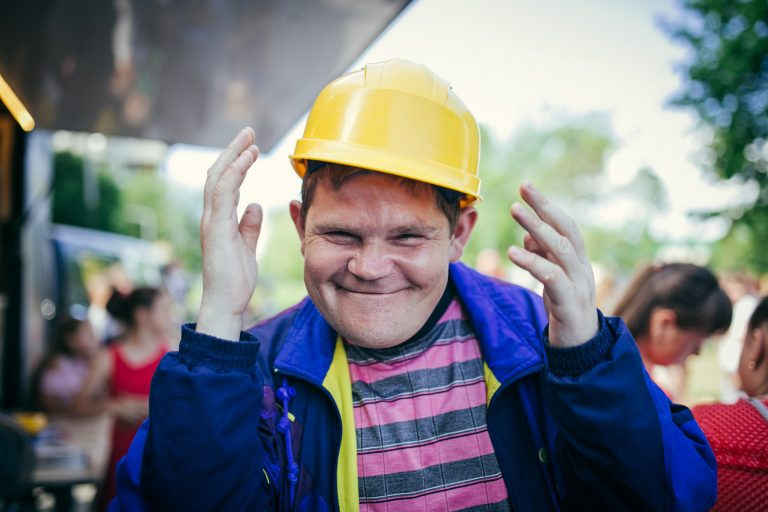
slideshow
In 2019, the Building Ukraine Together team (BUT) started fundraising for BUTmobile, the first mobile workshop in Ukraine that provides the technical capability to implement urban projects anywhere. The BUTmobile consists of a spacious van and a trailer. The van is used to carry volunteers,and the trailer is equipped with a multifunctional workshop with sliding shelves, tool racks and counter tops.
When the mobile workshop was ready, the team went on a tour of Ukrainian cities to get acquainted with local communities. Participants in these meetings can hear about local volunteer initiatives, attend workshops and eat burgers and burritos prepared in the trailer. The BUT mobile was used for many different projects in different cities. For example, in Chernivtsi the benches near the People’s House were repaired, and in Uzhgorod the yard of the Uzhgorod Plast center was renovated.
— When we arrive in a city, we normally organize an event for children and through them we communicate with adults and teenagers. We invite them to join the volunteer movement: The BUTmobile is great as a workshop with tools, but we can also use it for events when we take out the stage? and organize BUT-talks (informal lectures. — ed .). We invite speakers who share their stories of successful businesses, or successful public initiatives, or stories from the life of local government.

Funds for the new van and trailer were raised through contributions from philanthropists on community-based platforms like spilnokosht, from the Ukrainian diaspora, partner organizations, and regular benefactors (BURfriends). About 500 people from Ukraine, Europe, the USA and Australia have invested in this project.
— I have a clear understanding and belief that what we do is of the utmost importance. We still have 20 years to reach the standard of living of the country we want to live in. I personally have a very strong ambition to live in a strong country, which is why I do it.

Free Space
Pavlo Didula graduated from the Faculty of Philosophy and Theology at the Ukrainian Catholic University. He later lived in the United States for a time, researching the local Catholic Worker Movement Association of Catholic Communities. In the Dignity Revolution in 2014, Pavlo participated in the 15th “Self Defence of the Maidan”, ensuring the safety of participants in mass protests.
— The values of our family at some point coincided with the values of the Maidan. It was uncomfortable to look into the eyes of someone in the family, some of your loved ones, unless you were taking part in it. If at this historical moment you close your eyes to the crimes and do not take a stand, then at some point you will find yourself outside of the values that unite your family and you are no longer part of the community.

After the Maidan, Pavlo Didula founded the Free Space in Lviv together with his friends. This is a kind of alternative to dormitories where young people and students can come to learn, share experiences, and widen their outlook on life.
— The Free Space is evolving. We first rented an apartment in the center of Lviv, at 13 Pekarska Street. The war began and some students, some displaced people lived there. We experimented with how to create rules for the house so that people would be as active and social as possible, yet still have their own personal space. As part of this we arranged the space so that there is a quiet room, a common room, a living room for people and a shared kitchen. The most important rules of the house are that residents attend a fellowship dinner for a sense of community, volunteer regularly and start up their own projects.

The Free Space has grown into a network of alternative dormitories in several cities in Ukraine: Lviv, Kyiv, Odesa, Chernivtsi. The Free Spaces network also includes the BUT House, a guest house in Lviv, which from the beginning functioned as a refuge for the workers and volunteers of the Building Ukraine Together movement.
— The Free Space is first and foremost about people, about the community. Its values are God, dignity and solidarity:the same values that are very clearly expressed in the Maidan protests. What we do is rooted what the Maidan did and where the Maidan leads a person.

